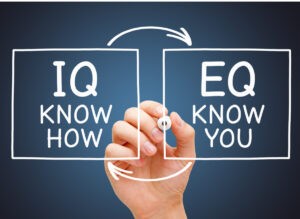Practice emotional intelligence by incorporating these simple, powerful phrases into your leadership vocabulary.
 Emotional intelligence is a must-have soft skill for leaders, and it’s not hard to spot the ones who possess it. People are drawn to high-EQ leaders. It’s apparent in the ways they interact with colleagues. You can even hear high emotional intelligence in the words they use every day.
Emotional intelligence is a must-have soft skill for leaders, and it’s not hard to spot the ones who possess it. People are drawn to high-EQ leaders. It’s apparent in the ways they interact with colleagues. You can even hear high emotional intelligence in the words they use every day.
Emotionally intelligent people want to know that their boss is emotionally intelligent, as well. That usually translates into wanting to see some self-awareness. Phrases like ‘I was wrong,’ ‘Oh, you’re right,’ and ‘I fell short on that one by not doing XYZ,’ all help employees know that.
As you work to become more self-aware of your own emotions, think carefully about your word choices with colleagues. Here are eight more phrases you can start to incorporate into your leadership vocabulary today to connect with and relate to your team members in more meaningful ways.
Luckily, emotional intelligence is one of those leadership skills that improves with regular practice.
These simple yet powerful phrases are a great place to start.
“Tell me more.”
Emotionally intelligent leaders typically possess another valuable soft skill: communication know-how.
They also understand that it can be challenging for others, and they’d never make assumptions based on a colleague’s words.
‘Tell me more about that,’ or ‘What did you mean when you said/did that?’ is a judgment-free way to get clarity. When leaders use these words, they are operating from a place of curiosity and compassion instead of judgment.
“How do you like to be communicated to?”
High-EQ leaders also don’t make assumptions about how others like to receive communication from them – they will always ask.
As humans, we all like to receive communication in different ways.
For instance, some people might appreciate face-to-face conversations while others prefer a simple text message. Emotionally intelligent leaders want to know about those preferences so they can adapt their communication style for each individual on their team.
“I appreciate you.”
Giving feedback is one area where emotionally intelligent leaders shine.
It may sound simple, and it’s such a small thing to do, but your team members appreciate it when you acknowledge a good job, and hearing their hard work is worth it.
Effective leaders who use this phrase also build stronger relationships and deeper trust with their colleagues, which is a good thing for everyone involved. Showing gratitude and acceptance is a sure-fire way to have positive engagement and employee satisfaction.
And putting some context around it makes it even more meaningful. Helping people to understand why you are grateful makes it more meaningful than simply saying thanks.
“What are your thoughts?”
Feedback is a two-way street for emotionally intelligent leaders.
Emotionally intelligent leaders are inclusive by nature and never stop looking for opportunities to bring the thoughts and views of others into a discussion. They recognize that they are not the smartest people in the room and look for ways to elevate others.
“I have a different perspective.”
High-EQ leaders don’t shy away from difficult conversations. Instead, they use disagreements as opportunities to start a dialogue and find common ground.
The phrase ‘I have a different perspective’ is a more emotionally intelligent way to say ‘I don’t agree.’
When those alternative views lead to conflict, try the the phrase: ‘It makes me [insert emotion/feeling] when you …’ This language demonstrates that the leader has given thought to what is happening and enables the other person to hear the impact of their actions.
“Are you OK?”
For most people, productivity ebbs and flows.
Some days we’re firing on all cylinders, some days we need a few extra cups of coffee just to get through the workday. Emotionally intelligent leaders know this and give their employees the benefit of the doubt. They also check in to make sure employees are OK.
There are times that people are not able to be the best, most productive versions of themselves. In times such as these, the response of emotionally intelligent leaders is not to berate them for missing a deadline or allowing the quality of work to slip. It’s to ask them, in an empathetic way, whether they are OK.
The wellbeing of other people is uppermost in the minds of high-EQ leaders, and this is just one way that they show it.
“I hear you.”
Empathy is a hallmark of emotional intelligence.
Showcasing empathy is the number-one way to show emotional intelligence, to demonstrate that you hear the other person and that you don’t have any hidden agenda driving your actions.
Phrases like ‘I hear you’ and ‘I understand’ are useful in bringing the language of empathy into your vocabulary.
An emotionally intelligent leaders isn’t afraid to admit when they are wrong.
“I’m sorry.”
Apologizing, in an honest way, demonstrates a high level of emotional intelligence as it shows a modesty and humility that followers really appreciate.
Humility is a key behavioral trait of emotionally intelligent leaders. They have the self-awareness to know when they’ve said something or acted in a way that upset or undermined another human and are determined to correct it as soon as possible.
Conclusion
Especially now, when team members are preparing for what comes next after the COVID-19 pandemic, it’s important not to skip the parts of leadership like personal relationship building.
The novelty of remote work has worn off for many people. The new normal has become just normal, and we’re not necessarily thinking about how to help our people navigate the adjustment, but instead, we’re focused on just getting our jobs done. This can cause us to let some of the more time-consuming parts of leadership fall to the wayside.
However, it’s more important than ever for leaders to continue to build EQ-enabled relationships to foster productive and energized teams.
As you work to be an emotionally intelligent leader, the phrases outlined above can help. While they won’t magically grant you high emotional intelligence, they will help you become a more empathetic, effective leader. And once you learn to recognize your own emotions through self-awareness, the benefits may help with your relationships outside of work, too.
This article, by Carla Rudder, first appeared on The Enterpriser’s Project, and has been shared under the CC-BY-SA license.
Read the original story here – 8 Powerful Phrases of Emotionally Intelligent Leaders
Handpicked Related Content
-
Are you a transformational leader – or headed there? Consider these four principles to inspire and motivate your team. Of all the leadership theories that have been posited over the years, few have the enduring simplicity of transformational leadership. Originally conceived…
-
Unresolved conflict on a team can cause everything from reduced execution to retention and morale problems. With so much at stake, here's how leaders can help their teams improve. Conflict is an inevitable and normal part of interactions – and teams…



